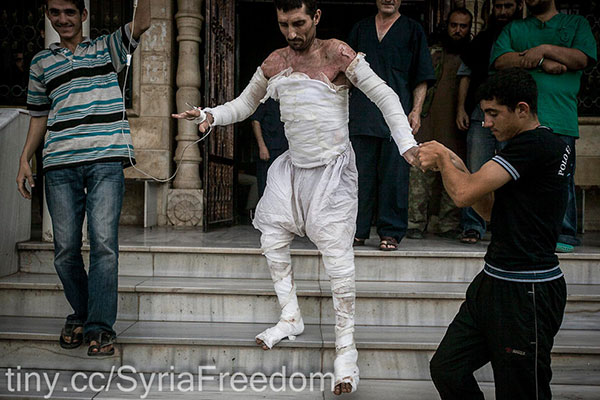
March 16, 2017; Reuters
As Syria continues its descent into chaos, lack of medical attention has risen to become one of the most pressing problems faced by civilians and fighters alike.
More than 400 hospitals have been destroyed, and many of the country’s 30,000 doctors have joined the tidal wave of refugees crashing into southeastern Europe. Medical professionals from several NGOs such as Médecins Sans Frontières (MSF), the Syrian American Medical Society, and the White Helmets have flown in to help, but all the doctors in the world can’t make up for a total lack of supplies and equipment.
MSF reported:
Though many doctors and nurses have left Syria, there are still quite a number of them in the country, and they still work to the extent that they are able. They are paid a salary by Damascus, but to get it, they have to go to into the area of Aleppo that’s held by government forces. There is only one route that is authorized for travel from the rebel-held areas and there are snipers present along the route. Every month, these medical professionals risk their lives to go and collect their pay. A doctor’s salary can vary between 100 and 200 dollars a month depending on the exchange rate, but still, it’s vital to these people.
On one level, doctors lack things like bandages and antiseptic solutions for treating wounds, sterile operating environments or tools for surgery, and antibiotics or painkillers for the immediate casualties of a war zone. But they also lack the ability to treat the ongoing medical issues that plague any society, like cancer, kidney and heart disease, and diabetes.
MSF donates vaccines and treatments for chronic issues like diabetes, epilepsy, and hypertension. However, other issues require complicated supplies like dialysis machines, chemotherapy, and x-rays. Equipment like that is expensive to buy and often tough to transport; plus, one misdirected bullet—a very real possibility at any time—can easily destroy a $10,000 machine. Doctors in Syria are consistently forced to make the kinds of awful choices no one ever wants to think about.
Sign up for our free newsletters
Subscribe to NPQ's newsletters to have our top stories delivered directly to your inbox.
By signing up, you agree to our privacy policy and terms of use, and to receive messages from NPQ and our partners.
“It’s a difficult thing to say, but with the cost of one cancer patient’s treatment, we can open up a clinic that treats hundreds of kids,” said Mohammad Yasser Tabbaa, a Syrian doctor in Saudi Arabia.
Tabbaa, co-founder of the Syrian Expatriate Medical Association, admitted that beyond performing palliative surgery and administering painkillers, there’s not much to be done for Syrian cancer patients. Even the Journal of Global Oncology has little hope of better treatment; they recommend “patient education on medical documentation and self-examination; online consultation; and cheap, effective screening methods”—a list that boils down to telling a patient, “Do the best you can by yourself.”
Even when agencies are able to ship equipment to the region, Reuters reported that “The United Nations says Syrian authorities have removed life-saving medicines from aid convoys sent to Douma and other besieged areas.” Even during ceasefires, humanitarian aid like food and medical supplies is often either stopped at the border or depleted before it gets where it is needed.
NPQ has previously cited the work of Margaret Bordeaux, a Harvard physician who specializes in health infrastructure in conflict zones. Dr. Bordeaux points out that in places like Syria, Bosnia, Iraq, or Sudan, where conflict persists for years and targets civilians and cities as well as military operations, health infrastructure is one of the hardest and most expensive things to rebuild. Not only do the casualties from destroying human services like healthcare often match or exceed military ones, but they can continue to happen long after a peace agreement is signed.
Syrian health services are operating in caves, basements, trailers, tents, or wherever they can set up a reasonably safe and sanitary operation. Hospitals frequently get rebuilt or relocated, making it harder for people to know where to go. Ambulances are few and far between, and easy targets, so patients are often transported on motorbikes.
The NGOs operating in Syria are doing the best they can with limited resources. But as the western world struggles to deal with the refugee crisis overwhelming its borders, it becomes increasingly clear that the struggles in the places the refugees are fleeing are becoming unimaginably more difficult. – Erin Rubin













